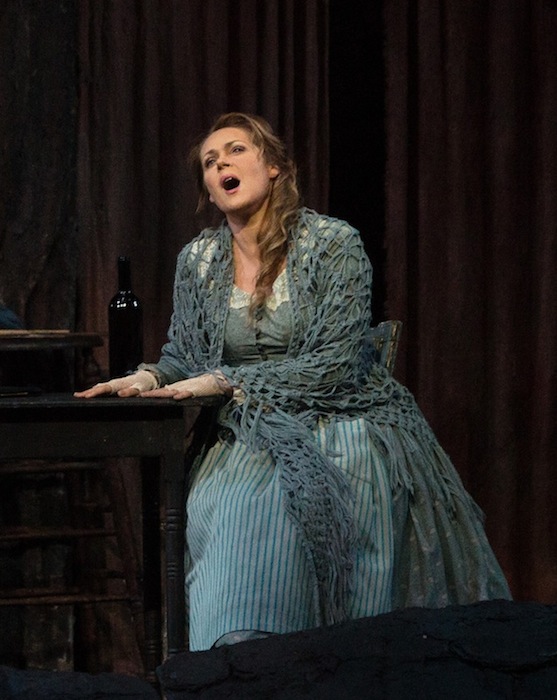Despite stage mishap, comedy and tragedy touch the heart in Met’s starry “Bohème”

Kristine Opolais as Mimi in the Metropolitan Opera production of Puccini’s “La Boheme.” Photo: Marty Sohl
During the “brief pause” after the first act of La Bohème at the Metropolitan Opera on Thursday, a few crashes were heard from behind the curtain, and before long an impromptu intermission was announced: it seemed, for a moment, that the beloved and besieged Zeffirelli Bohème had finally given up the ghost for good.
Compound the fact that this is one of the oldest productions in the Met’s current repertory with the fact that Bohème is the most-performed opera in the company’s history, and it’s no surprise that jokes about the sets’ imminent collapse have as much currency as they do.
Fortunately, Thursday’s mishap was minor and the show went on with Café Momus appearing unscathed, but the incident somehow set the tone for the evening. Between the backstage fender-bender and a hyperactive snow machine, the Zeffirelli Bohème seemed hell-bent on having a little fun at its own expense.
Under the supervision of stage director J. Knighten Smit, cheekiness was the watchword for Thursday’s star-stacked cast. The curtain opened to reveal Mariusz Kwiecien, our Marcello, attacking his canvas with Pollock-like violence. Dashing up the hill after her spat with the painter in Act III, Musetta (Marina Rebeka) grabbed the first guy she could find and dragged him home. Even the dancing bear at Momus seemed more lively than usual.
But far from instilling a sense of camp, the humor made the earnest moments seem all the more affecting by contrast. The flatmates’ humble feast in Act I was beautifully natural, and the quartet wonderfully sung. Kristine Opolais’s final battle with illness as Mimì, trying with all her might to stay on her feet towards the beginning of the fourth act, was devastating to watch.
Otherwise, Opolais’s performance was mixed. Her voice in the early acts sounded wide, not quite wobbling, but lacking focus; and her acting, usually a particular strength of this singer, included a lot of hand-sweeping, gesturing vaguely in the direction of lethargy. Only as she lay dying in Act IV did she make a convincing image, toning down the scoops and slides to present simple, direct singing.
Her Rodolfo was Jean-Francois Borras, who impressed in his debut last season, subbing as Werther for an ailing Jonas Kaufmann. Borras displayed a firm, golden tone that he was able to sustain throughout the evening. Parts of the role sit a little low for him, but his top notes—one momentary snag in “Che gelida manina” apart—were vibrant.
Marina Rebeka is just coming off a bravura performance in La Traviata, and her fierce Musetta again showed her to be a formidable artist with real star potential. Her “Quando m’en vo” was among the best renditions heard at the house in recent years. Easily filling the stage with her presence, she sang with a lavish silken tone and sensitive, twisting phrasing. Her only lapse in judgment—or the director’s—was stepping down to the apron to show off a pianissimo on one of her top B’s.
One could hardly ask for a stronger supporting cast. Kwiecien made a particularly energetic Marcello, and his dynamic, smoky baritone was in top form. Alessio Arduini was an excellent Schaunard, showing a leathery tone and hopping energy. David Soar was reserved as Colline, but sang a touching “Vecchia Zimara,” his voice fluid with just a hint of gravel. John Del Carlo is still the best bet around for the Benoit-Alcindoro combo, an actor with superb comic sense who can deliver a vocal performance beyond the reach of most character basses.
Riccardo Frizza coaxed lush playing out of the orchestra and conducted with an almost cinematic scope. He briefly lost control in the second act, but for the most part supported the singers beautifully, rising and falling with the dramatic demands of the piece.
La Bohème runs through January 24 at the Metropolitan Opera. metopera.org.



Posted Jan 17, 2015 at 3:03 am by SFR Daniel
This sounds like something I would like to see, unfortunately unable to cross Atlantic in time to do that. I saw David Soar in a concert performance of Stiffelio in London last summer. He was reserved in that also! Sang so beautifully, a beautiful voice.
Posted Jan 20, 2015 at 11:06 am by Stan
I saw the second performance – Jan 19. I have to agree; this was one of the best casts I have heard in Boheme in any years. EVERYBODY (even the customs agent (!) was superb, especially Borras, who, hopefully, will have a great career. I had caught his Met debut as Werther. He replaced Jonas Kauffman, and far from being a disappointment, he was very warmly received. Mariusz Kwiecien was certainly the best Marcello in many years at the Met. Ditto for Marina Rebeka (who debuted at the Met as Donna Anna). My only disagreement; I felt Opolais was great, as was everyone else. David Soar reminded me of a young James Morris. There are two performances left. Check it out.
Posted Feb 05, 2015 at 3:22 pm by Dash
I was at said performance. Excluding the technical diffuculties I really enjoyed the performance. I hope to see more from the cast